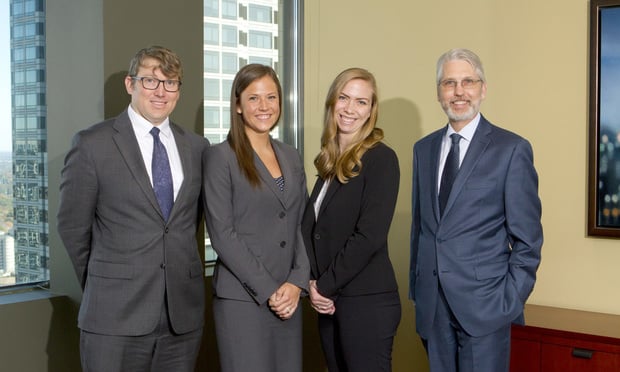Jury Awards $1M to Lawyer Stiffed on Legal Fee After IRS Whistleblower Case Settled
The plaintiff was to receive 20% of any settlement from the whistleblower case, but his client instead said he'd get "zero" of the $4.9 million award.
November 13, 2019 at 02:23 PM
7 minute read
 L-R: Zachary Zimmerman, Megan Naioti, paralegal Stephanie Pippin and Kevin Ward.
L-R: Zachary Zimmerman, Megan Naioti, paralegal Stephanie Pippin and Kevin Ward.
A federal jury awarded nearly $1 million in damages to a lawyer who claimed his client, a friend for decades and the relator in an Internal Revenue Service whistleblower case, stiffed him out of his share of the proceeds from the case.
Because the jury found the defendant, also a lawyer, engaged in bad faith and was stubbornly litigious, there will be further litigation regarding an award of attorney fees, said the plaintiff's lead attorney, Kevin Ward.
The litigation was unfortunate because his client, Paul Roman, had been close friends for decades with the defendant, North Carolina tax lawyer Gregory Bryant, before the dispute shattered the relationship.
"They were so close, Paul Roman used to be referred to as the 'fourth brother' in the Bryant family," said Ward, who tried the case with Schulten Ward Turner & Weiss partner J. Zachary Zimmerman and associate partner Megan Naioti.
Bryant is represented by Womble Bond Dickinson partner R. Dal Burton, who did not immediately respond to a query Tuesday.
According to Ward and court filings, Bryant was an attorney and certified public accountant at Cherry Bekaert when, around 2011, he became aware that a client, Atlanta-based software supplier Ebix, may have engaged in potentially unlawful conduct.
Ward said the underlying fraud involved about $98 million Ebix was trying to bring into the United States without taxes through a "complex scheme of buying and selling stocks."
Bryant was not willing to sign off on the scheme, Ward said, and ultimately decided to leave the company. He went on to found the Bryant International Law and Tax Group in Raleigh.
Bryant asked Roman to help him file a whistleblower complaint with the IRS in 2012. Roman sought out the help of attorney Page Pate, who was experienced with such cases and had co-counseled with Roman on other matters.
The three signed a representation agreement in which Bryant agreed to a 30% contingency fee of any award that might be forthcoming, with 20% going to Roman and 10% to Pate, now a partner with Pate, Johnson & Church.
The agreement included a stipulation that any money the IRS paid would be signed over to Roman and placed in his escrow account, according to the complaint and an attached copy of the agreement.
Ward said that proviso was added as a safeguard because any whistleblower award is signed over directly to the relator, "and this is not the first time whistleblowers have refused to pay their lawyers when the money comes in."
The IRS recovered about $21 million from Ebix in 2017, and awarded Bryant nearly $5 million.
According to plaintiff's filings, Bryant "almost immediately" sought to reduce Pate's share to 5%, and refused to pay Roman at all.
Pate was ultimately paid his 10%, but Bryant was adamant Roman was getting nothing.
An August 2017 email from Bryant to Roman said, "Paul I am not sure what is wrong with you so I will make it clear. Page is getting paid [$]491,000 and you are getting zero. He represented me and you did nothing but give me bad advice which, thankfully, I disregarded. When I asked for you help you ridiculed (sic) and told me to discuss it with Page."
Roman sued Bryant later that year in Georgia's Northern District for claims that included breach of contract, unjust enrichment and constructive trust.
Bryant filed multiple counterclaims, asserting there was never a valid representation agreement, and that there was an "alternate agreement" between Bryant and Roman under which—rather than payment—Bryant would build a house on property Roman owned in the Bahamas, and they would co-own it.
The representation agreement was purely for appearances "so Pate would not insist on a higher percentage," according to defense filings.
Ward said the defense raised numerous arguments as to why Roman should not be paid.
"We went from excuse to excuse," Ward said.
"Their first argument was that there was no contract: 'Paul Roman was never my lawyer,' " he said.
When Judge Thomas Thrash Jr. ordered that the contract be produced, the argument was "Oh yeah, there was a contract but it was a sham," Ward said.
"Then they said, 'If there was a contract, Paul Roman breached it,' " Ward said.
Ward said there were some discussions about settling and failed mediation before the case went to trial Nov. 4.
At trial, the defense called on Georgia State University College of Law Professor Clark Cunningham, who teaches law and ethics.
"He testified that he believed Mr. Roman did no work, and that it violated the contract to take 20% of the award, that it was too high for no risk," Ward said.
"The problem was that professor Cunningham completely negated the hundreds of hours Paul spent on this case," he said.
Roman testified that he and Bryant frequently discussed the case, "to the point where it became all-pervasive; it infected every aspect of their relationship," Ward said.
As to the risk of handling such a case, Ward said he presented data showing that more than 90% are dismissed by the courts, and only 2% to 4% result in a payment to the relator.
"You can expect to spend five or 10 years on one of these cases," he said. "It's a very risky venture for the lawyer."
Ward said the argument about the alternative contract fell flat.
"This argument that there was going to be a house in the Bahamas they'd share as joint tenants was absolute nonsense," he said. "Greg Bryant has a [master of laws] degree, he's a CPA. This alleged oral contract had no specificity as to when the house would be built, its size, how much it would cost. By his own admission at trial it violated the statute of frauds."
Pate also testified that he was satisfied with the agreement, although "it might have been a little more work than he expected in the beginning," Ward said.
Reached by phone, Pate said that was an accurate reflection of his testimony.
In closing, Ward said Burton asked the jury for a defense verdict or "maybe a few thousand dollars" to represent the seven or so hours Cunningham opined he had worked on the case.
"He said, 'Maybe as high as $125,000, but in no event should Mr. Roman get more than Mr. Pate.'"
"My argument was, 'Mr. Bryant is in the business of finding tax loopholes for people, and now he's trying to get out of paying his contracted fee,' " Ward said. "And the jury agreed completely."
On Nov. 8, the jury awarded Roman $989,076, precisely what Ward asked for in his closing statement.
In a conversation afterward, he said the jurors were displeased by Bryant's assertions that Roman was not, and had never been, his lawyer. The jurors also did not like that Cunningham testified Roman did no work on the case, Ward said.
"Mr. Bryant testified that Paul Roman was not his attorney for one second; that angered the jury," Ward said.
This content has been archived. It is available through our partners, LexisNexis® and Bloomberg Law.
To view this content, please continue to their sites.
Not a Lexis Subscriber?
Subscribe Now
Not a Bloomberg Law Subscriber?
Subscribe Now
NOT FOR REPRINT
© 2025 ALM Global, LLC, All Rights Reserved. Request academic re-use from www.copyright.com. All other uses, submit a request to [email protected]. For more information visit Asset & Logo Licensing.
You Might Like
View All



Alston & Bird, Baker Hostetler, Holland & Knight Promote Partners in Southeast
5 minute readLaw Firms Mentioned
Trending Stories
- 1The 'Motherhood Advantage' in Law: Time to Flip the Script
- 2Fenwick & West Shutters Decade-Old Shanghai Office
- 3Thompson Coe, 2 Lawyers, Hit by $1M+ Legal Mal Suit
- 4Regulatory Intelligence Platform Abstract Announces $4.8 Million in Seed Funding
- 5Former Sacks Weston Partner Faces 5-Year Suspension Over Mail, Wire Fraud Conviction
Who Got The Work
Michael G. Bongiorno, Andrew Scott Dulberg and Elizabeth E. Driscoll from Wilmer Cutler Pickering Hale and Dorr have stepped in to represent Symbotic Inc., an A.I.-enabled technology platform that focuses on increasing supply chain efficiency, and other defendants in a pending shareholder derivative lawsuit. The case, filed Oct. 2 in Massachusetts District Court by the Brown Law Firm on behalf of Stephen Austen, accuses certain officers and directors of misleading investors in regard to Symbotic's potential for margin growth by failing to disclose that the company was not equipped to timely deploy its systems or manage expenses through project delays. The case, assigned to U.S. District Judge Nathaniel M. Gorton, is 1:24-cv-12522, Austen v. Cohen et al.
Who Got The Work
Edmund Polubinski and Marie Killmond of Davis Polk & Wardwell have entered appearances for data platform software development company MongoDB and other defendants in a pending shareholder derivative lawsuit. The action, filed Oct. 7 in New York Southern District Court by the Brown Law Firm, accuses the company's directors and/or officers of falsely expressing confidence in the company’s restructuring of its sales incentive plan and downplaying the severity of decreases in its upfront commitments. The case is 1:24-cv-07594, Roy v. Ittycheria et al.
Who Got The Work
Amy O. Bruchs and Kurt F. Ellison of Michael Best & Friedrich have entered appearances for Epic Systems Corp. in a pending employment discrimination lawsuit. The suit was filed Sept. 7 in Wisconsin Western District Court by Levine Eisberner LLC and Siri & Glimstad on behalf of a project manager who claims that he was wrongfully terminated after applying for a religious exemption to the defendant's COVID-19 vaccine mandate. The case, assigned to U.S. Magistrate Judge Anita Marie Boor, is 3:24-cv-00630, Secker, Nathan v. Epic Systems Corporation.
Who Got The Work
David X. Sullivan, Thomas J. Finn and Gregory A. Hall from McCarter & English have entered appearances for Sunrun Installation Services in a pending civil rights lawsuit. The complaint was filed Sept. 4 in Connecticut District Court by attorney Robert M. Berke on behalf of former employee George Edward Steins, who was arrested and charged with employing an unregistered home improvement salesperson. The complaint alleges that had Sunrun informed the Connecticut Department of Consumer Protection that the plaintiff's employment had ended in 2017 and that he no longer held Sunrun's home improvement contractor license, he would not have been hit with charges, which were dismissed in May 2024. The case, assigned to U.S. District Judge Jeffrey A. Meyer, is 3:24-cv-01423, Steins v. Sunrun, Inc. et al.
Who Got The Work
Greenberg Traurig shareholder Joshua L. Raskin has entered an appearance for boohoo.com UK Ltd. in a pending patent infringement lawsuit. The suit, filed Sept. 3 in Texas Eastern District Court by Rozier Hardt McDonough on behalf of Alto Dynamics, asserts five patents related to an online shopping platform. The case, assigned to U.S. District Judge Rodney Gilstrap, is 2:24-cv-00719, Alto Dynamics, LLC v. boohoo.com UK Limited.
Featured Firms
Law Offices of Gary Martin Hays & Associates, P.C.
(470) 294-1674
Law Offices of Mark E. Salomone
(857) 444-6468
Smith & Hassler
(713) 739-1250






